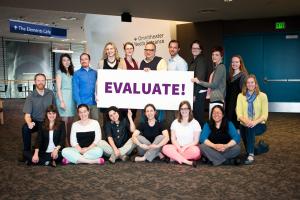
Evaluation in the NISE Network
Evaluation has played a key role in helping to inform and improve the work of the NISE Network. Over the course of the NISE Network, more than 250 front-end, formative, and summative evaluation studies have been conducted about NISE Net products and practices. In particular, studies have focused on the public and professional impacts of the NISE Network’s various projects. The evaluation efforts have typically involved a multi-organizational team and an external committee of visitors (COV), to help oversee the work. In addition, the Evaluation group has helped other Network teams gather data to inform their own work through a process called Team-Based Inquiry.
If you have questions or want further information about the evaluation, please contact Liz Kunz Kollmann (ekollmann@mos.org)
What are different types of Evaluation and Research Studies?
Evaluation is a process used to improve the design and function of educational experiences in informal learning environments and to measure progress toward goals.
Front-End Evaluation
During the early stages of a project, front-end evaluation is used to learn about visitors’ familiarity with a topic, their interests and feelings, and what understandings they bring to an experience. Front-end evaluation work may include collecting data from visitors or reviewing literature from the field and related projects.
Browse Front-End Evaluation Reports
Formative Evaluation

During the design and development stage of a project, formative evaluation is used to help achieve desired goals; formative evaluation involves iterative testing and modification of prototype exhibits, materials, and programs.
Browse Formative Evaluation Reports
Summative Evaluation Studies
Summative evaluation typically occurs at the end of a project to assess the impact of the completed project. This process usually includes observing visitors while they experience a program or exhibit and interviewing or surveying them before and/or after this experience.The NISE Network Evaluation Team has conducted several summative studies investigating issues related to public and professional impacts across the Network.
Browse Summative Evaluation Reports
Evaluation Tools
Browse Evaluation Tools and Team Based Inquiry Resources
Professional development and capacity building evaluation tools for educators to improve their products and practices with the intent to more effectively engage public and professional audiences.
Research
Research studies
Research studies are designed to generate findings that will inform the broader field of informal science education. Research studies typically use methods similar to formative and summative evaluation, such as observations, interviews, and surveys with participants; however findings from these studies are often shared more widely to advance informal science education efforts.
![]()
Learn more about NISE Network Research Studies
